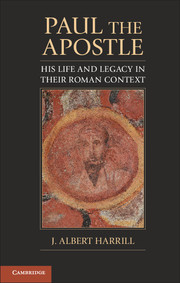Book contents
- Frontmatter
- Contents
- Figures and Boxes
- Preface
- Introduction
- PART I The Life
- PART II The Legend
- 4 Competing Stories about Paul in Late Antiquity
- 5 Paul the Scriptural Authority
- 6 How the West Got Paul Wrong
- Conclusion: Going beyond the Epitaph
- Appendix 1: Extant Writings Attributed to Saint Paul in Rough Chronological Order
- Appendix 2: Reconstructing Paul's Corinthian Correspondence: A Puzzle
- Appendix 3: Ancient Christian Works Containing Pauline Traditions and Legends
- Notes and Further Reading
- Bibliography
- Index of Biblical Citations
- Index
5 - Paul the Scriptural Authority
Contradictory Discourses
Published online by Cambridge University Press: 05 November 2012
- Frontmatter
- Contents
- Figures and Boxes
- Preface
- Introduction
- PART I The Life
- PART II The Legend
- 4 Competing Stories about Paul in Late Antiquity
- 5 Paul the Scriptural Authority
- 6 How the West Got Paul Wrong
- Conclusion: Going beyond the Epitaph
- Appendix 1: Extant Writings Attributed to Saint Paul in Rough Chronological Order
- Appendix 2: Reconstructing Paul's Corinthian Correspondence: A Puzzle
- Appendix 3: Ancient Christian Works Containing Pauline Traditions and Legends
- Notes and Further Reading
- Bibliography
- Index of Biblical Citations
- Index
Summary
Late ancient Christians, seeking meaning for Paul, developed contrasting ideas about the nature of the apostle as an oracle of God. In this chapter, I discuss their diverse literary discourses (in the second to the fourth centuries), in which Paul was not so much a story character to embrace or argue with, but really a kind of book to quote from. The survey includes a number of different Christian writers; some number among the celebrated “fathers of the church” (patristics is the modern study of these writers), while others have faded into the fog of history as so-called heretics. Yet neither ecclesiastical nor scriptural orthodoxy existed in the pre-Constantinian period, an important point to keep in mind throughout this chapter. All these writers belong to the history of Christianity.
The late ancient writers are, in order of their appearance in our survey, Marcion and Valentinus (mid second century), Irenaeus (late second century), Origen (third century), and John Chrysostom (fourth century). These teachers formulated many different “scriptural Pauls.” I begin with a consideration of how Paul's letters, when they became collected into a “book” (Greek codex), shaped the content of ancient Christian literary culture.
- Type
- Chapter
- Information
- Paul the ApostleHis Life and Legacy in their Roman Context, pp. 120 - 137Publisher: Cambridge University PressPrint publication year: 2012



